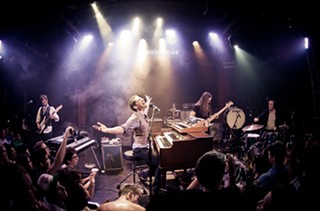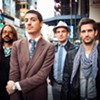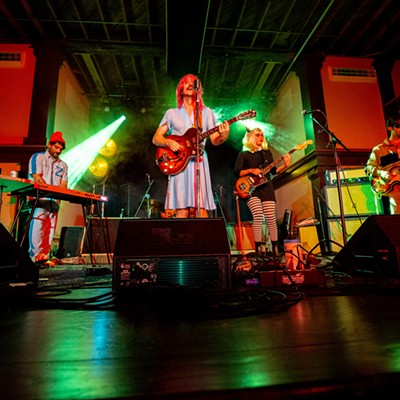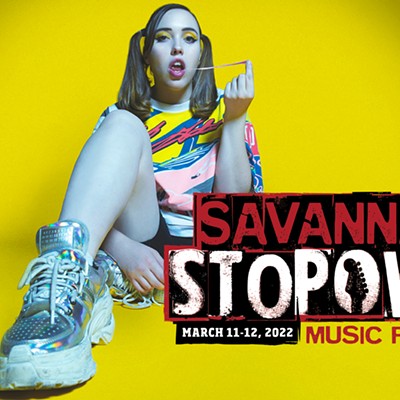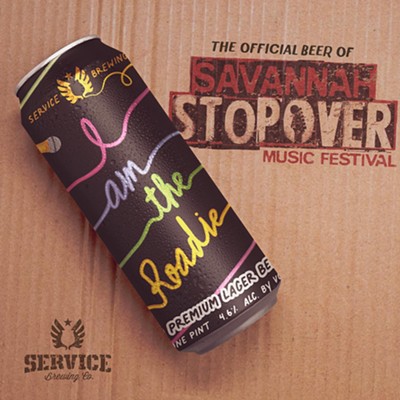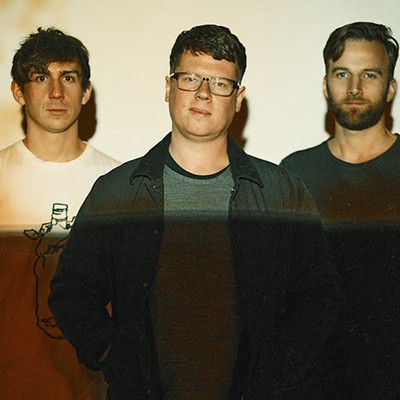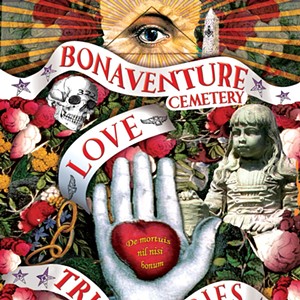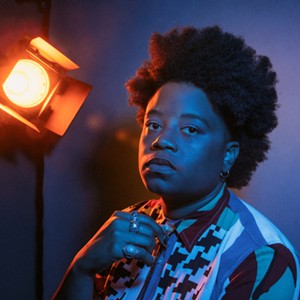With a reputation as a vibrant and exciting live band, New Orleans-based Mutemath may be the most event-appropriate act to play SCAD's end-of-school-year concert since the genuinely joyous Michael Franti & Spearhead in 2009.
This is, after all, a celebration.
Sometimes lovingly referred to as “Coldplay with chaos,” Mutemath revolves around singer, songwriter and pianist Paul Meeny, a flamboyant frontman with a strong, soulful voice. Drummer Darren King, who co-founded the band with Meany, is an acrobatic (aerodynamic?) percussionist, and both bassist Roy Mitchell-Cardenas and guitarist Todd Gummerman are rarely planted for long.
Meany’s celebrated antics include stage-diving onto a lit-up air mattress (as to how he’s going to make that work around the Forsyth fountain, your guess is as good as ours.)
The music coolly combines New Orleans dance/rock, old-school rhythm and blues and chilly British synth-pop. And other less tangible ingredients.
Mutemath’s story is not without controversy; after coming together in 2001, the band independently released a debut EP. Its success attracted big ol’ Warner Bros., which attempted to issue subsequent Mutemath records through Word, its Contemporary Christian subsidiary label.
Although Meany’s previous band (Earthsuit) had been a moderately successful Christian rock band, he and King had decided that the new one (Mutemath) was not going to skew overtly religious. He, King and the others did not wish their music marketed to an exclusively Christian audience. Apparently, nobody told Warner Bros.
The band sued and won. And these days, everybody’s happy.
Best known for 2007’s “Typical,” a fierce and infectious rocker that spawned a brilliant, Grammy-nominated video, Mutemath is currently working on a new album, the followup to 2011’s Odd Soul.
CS: Your live show is very energetic. You, in particular, work up a sweat. Who or what inspired you to perform that way?
Paul Meany: The thing that opened my eyes the most: I remember the first time I got exposed to the Police live. They were done by the time I was checking things out, but I stumbled upon one of their live concerts on VH1. And it left a big impression on me.
I was already a fan. I had heard things on the radio or whatever. But seeing how the m.o. was all about expanding the music wide, letting it feel that whatever happens onstage is very much of the moment, that kind of wrote the textbook for me on everything I wanted to aspire to live. And I remember seeing a Beastie Boys show ... there’s just something about when you feel that the goal of the people onstage is just to be in that moment with you as the audience.
In the very beginning, Mutemath was essentially an experimental pop group. That was really all we were setting up to do. And it was really just me and the drummer. A lot of it was more ambient, laid-back stuff. But as we began to perform it —they weren’t necessarily rock songs—we would let things happen live. And it would develop. And we started adding people to the show. And it just kind of became this thing. We would always go with it.
So whatever we’ve become live has really just been years of evolution, and chasing whatever the moment feels like. And I like that about our band.
CS: Mutemath evolved from your earlier band, which made pointedly Christian rock music. You've gone to some lengths to distance yourself from that part of your musical life. Do you feel like being a practicing Christian still imbues your music?
PM: We've never shied away from where we're from, how we've grown up, and all that's a very real part of our lives. Me and Darren were pretty much through-and-through church kids. It's certainly at the forefront of my mind a lot. And when it comes to writing songs, you cross those roads every now and then. For us, it's always been trying to make music that feels relevant to us and part of who we are. And is not canned.
I don’t know how much I’ve circumvented around the question ...
CS: Yeah, you did a nice tap-dance there [laughter].
PM: [Laughter]. The idea of Christian music and a Christian band doesn't make much sense to me. I get it, I understand why people think of things in that term, but it doesn't make much sense. Especially when you're trying to create music ... I mean, what is it? It's music about the Bible?
It’s very subjective, because one person’s Christian band is another person’s “heathen” band! It’s amazing to me because a lot of bands who attract that sort of stigma have more picketers or protesters show up outside their shows than anyone. So I don’t know, I think when you start flirting with spiritual subject matters, it becomes a push-button. But that’s not a deterrent for us as far as allowing ourselves to go there. We just want to go there on our terms, that’s all.
CS: Tell me about how you and Darren began writing together? You were in New Orleans and he was in Missouri ... how did that work?
PM: He was a fan of the band I was in. After a show and meeting up, we had stayed in touch. He would send me stuff that he was working on. This high school kid who had all the ambition in the world; he didn't know much about music, he just wanted to do it. His ambition was very infectious.
I remember being pretty surprised at how thoughtful his stuff was. It was probably more sound effects and soundscapes than it was actually music, but it was really good. I would inject some chords, and I started singing a bit on it, and I’d send it back to him. He’d work on it. We just went back and forth, and it started becoming something real.
I invited him down to New Orleans. I said “Let’s try to get in the same room and see what happens.” And the first song we worked on became part of “Typical.”
CS: The band was called Math then. Was that because it was electronic and synthesized?
PM: I think so, yeah. It felt like what we were doing was very sampler and computer-driven. When we started saying "OK, this is something we're gonna go for," and we added a guitar player and started working on our first EP, we didn't feel like calling it Math any more. That was just a stepping stone to what it was going to become. Darren's e-mail at the time was "Mutemath." That's about all that took. Of course, we did the obligatory rounds of months and months of writing down all kinds of names, none of which we were happy with.
Shortly after we put out the EP we found Roy, who became our bass player. Once we got the four guys locked in, it felt like we had something.

